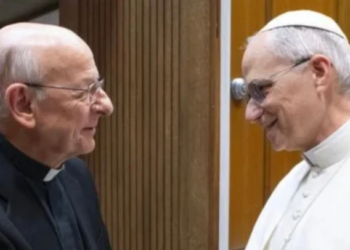A strange new tactic is taking on a central role in the pro-abortion world. Abortion, says this newly prevailing strategy, is not just a choice someone should be free to make so as to live out their chosen lifestyle. No, abortion is a moral good, an act of the highest love and selflessness.
This approach takes the pro-life rallying cry to love both the mother and child and says, Yes, we are in total agreement. Love the mother and love the child — but love the child by killing the child. Yes, really.
Consider what an abortion doctor, Jamila Perritt, said on the matter earlier this year in Ms. Magazine.
“The foundation of the work I do as an abortion provider has always been, and will always be, love,” said Perritt. “I know that abortion care is an act of love.”
Perritt said this encompasses “Love for our communities. Love for our families. Love for ourselves.”
Perritt is the president and CEO of Physicians for Reproductive Health, meaning that she has a prominent role in leading the discourse on abortion within the pro-choice movement.
How have we gotten to this point? How have we reached a situation where abortion — that is, the killing of human beings — is being justified based on love? (RELATED: America’s Abortion Blind Spot: How Liberals Convinced Americans to Ignore the Fetus)
A first place to look is a 2018 book titled Scarlet A: The Ethics, Law, and Politics of Ordinary Abortion. The author, Katie Watson, was on the frontlines of declaring that abortion should not be looked down upon as a difficult choice but rather should be celebrated as beneficial for society. In one interview, Watson stated, “I refuse to stop talking about abortion and stressing that it is a moral, political, and social good.”
In 2019, I attended a lecture by Watson (to report on it). She spoke of “abortion beneficiaries,” that is, all of the people who have supposedly benefitted from abortion. Watson claimed this included everyone in the room. Of special benefit, she asserted, were those whose siblings had been aborted, thus leaving their parents with more financial resources. (RELATED: Why Trump Should Act Against Abortion)
Watson’s ideas followed the #ShoutYourAbortion movement of 2015, in which thousands of women spoke positively in social media posts about abortions they had procured and all the “benefits” those abortions had on their lives. The inaugural tweet of the moment, by abortion activist Lindy West, said, “My abortion was in ’10 & the career I’ve built since then fulfills me & makes me better able to care for kids I have now #ShoutYourAbortion.”
Figures like Scarlet A author Katie Watson, as well as the #ShoutYourAbortion movement, remained at the level of arguing that abortion was a great benefit to society in terms of safety and resources. Yet, at this time, other members of the pro-abortion movement began to push the narrative, arguing that abortion, more than being societally beneficial, was a loving act.
In November 2019, a blog post published by the National Women’s Law Center asserted that “abortion is love” in the strongest terms possible. “The media often paints abortion as a divisive political issue,” said the author, “but here’s the truth: abortion actually is an act of love, an act of compassion, an act of healing, and an act of selflessness.” The author was, she said, “sick and tired of having to justify why we need to be able to get an abortion.”
The essay captured well the emerging new argument. The following year, in 2020, a podcast named Abortion, With Love was launched. In the inaugural episode, the show’s host, Camila Ochoa Mendoza, says: “I hope that through these conversations, we can reshape the story of abortion to be a story about love.”
Abortion, With Love published numerous audio letters from women who framed their abortions in terms of love. The letters can only be described as disturbing.
In one letter, titled “Dear Seedling,” a woman writes to the unborn child she aborted. The woman asserts to her child that killing him or her was a gift. She writes, “You have returned to the magical dust of the universe perhaps part of an ancient wise tree or a droplet in the sea … This was an abortion with love and I thank the ancestral feminine that has always held this wisdom. And I thank you for being with me and the teachings you offered.”
Shocking, in particular, is the way in which this writer recognizes the humanity of her baby and yet still thinks that killing the child is loving. Evidently, the writer believed the baby would be better off as a “droplet in the sea” — i.e. dead — than as an unwanted baby, and felt empowered to act on that belief.
It sounds eerily similar to the way people are discussing euthanasia as a “loving” way to “release” people from suffering. (“Euthanasia is an act of love towards individuals who are suffering and wanting to die,” asserted David San Filippo in 2013. “Euthanasia is an act of love and kindness, a final gift we can give our little loved ones when their quality of life has deteriorated beyond repair,” wrote Louise Feaheny earlier this year.) (RELATED: The Horrific Assisted Suicide Boom in Canada)
In another essay, this time published in 2020 in Brevity magazine, a woman named Amie Whittemore listed 55 reasons that “This Abortion is an Act of Love.” Among those reasons were “my hips,” “my cats,” “silence,” “trees,” “Sumatran rhinos,” “organic farms,” “coral,” and “whales” — these things supposedly benefited from the death of the child.
The new mantra “abortion is love” caught on. In 2021, the Avow Foundation for Abortion Access launched with the goal of “unapologetic abortion advocacy.” It began selling T-shirts that said “Abortion is love.” The organization explained its shirts by saying, “For the vast majority of people, accessing abortion care is about love. Love for the families they already have, love for the children they want to have in the future when the timing is right, love for themselves and their dreams.”
This “abortion is love” claim reached disturbing new heights in a 2023 essay by Daniela Kent titled “My Abortion Was an Act of Love.” What makes this essay so terrifying is the extent to which Kent recognizes the life and humanity of her unborn baby and is still happy to kill him or her anyway.
When she became pregnant, Kent writes, she immediately felt overwhelming motherly love toward her child. “It was love, though, a very specific kind of love,” she writes. “A kind of love I had never felt before and haven’t felt since.”
Kent said that her “heart wanted to continue the pregnancy.” And yet, in large part because her boyfriend wasn’t enthusiastic about the child, Kent decided to get an abortion, knowing it would give her unbearable pain because of the love she had for her unborn child. “I knew [the abortion] was going to hurt like nothing had ever hurt before,” Kent writes. “I knew this, because the love I was feeling for this little being was more than anything I had ever felt before.”
And yet, Kent believes that aborting this child was “the most loving choice I have ever made.” She justifies this on the basis of her belief that her unborn baby “deserved” to have a father who was “ready.” Bafflingly, Kent wrote that her abortion “taught [her] that even when love is hard, it is always the right choice.”
A difficult part of responding to the “abortion is love” argument is the fact that its proponents are, in many circumstances, happy to admit that the unborn child is a human person. They simply believe that a woman should be able to “lovingly” decide whether that child lives or dies.
It is as though the woman is a god and, whether she chooses to preserve or extinguish life, she is exercising a special creative power.
It is as though she alone possesses a special knowledge about whether it would be better for that child to be raised by her or to be “returned to the magical dust of the universe.” Whatever choice the woman makes, it is made out of “love” for that child, herself, and her broader community.
The only real answer to these people’s insanity and depravity is true love. This argument was put forward earlier this year in an essay by Amber Roseboom, the president of Right to Life of Michigan. In her essay, titled “Abortion is Not Love,” she writes: “Love isn’t about satisfying a need for ourselves. It is about seeking the good for the other person.” Roseboom asserts that, in contrast to this, the pro-abortion movement “twists love into something destructive.”
Roseboom speaks practically about how this true, “self-sacrificing love” can counter this twisted destruction. This true love includes, she says, “expanding prenatal and postnatal care,” telling the truth about abortion, showing compassion to unexpectedly pregnant women, and connecting pregnant women with local pregnancy resource centers.
*****
These “abortion is love” people may seem so far lost that conversion to reality is impossible. But the idea that murdering one’s own children is a loving act is so inherently false and evil that it can only be held up for so long before it shrinks in the face of the truth. In fact, Daniela Kent, who wrote the essay “My Abortion Was an Act of Love,” went on to describe how, after her abortion, she “fell into a depression” and “wasn’t okay for about a year and a half.”
Kent’s experience suggests that those who take the pro-abortion stance to its logical conclusion — and believe that they should be able to “lovingly” kill — will eventually be confronted with the disturbing reality of what is, in fact, murder.
READ MORE from Ellie Gardey Holmes:
Newsom Can’t Memory-Hole What He Did to California
Americans Revel in Connection to Pope Leo XIV
A Miracle Baby Is Surviving His Mother’s Brain Death, and the Left Is Outraged





![CNN’s Jennings Roasts Biden's 'The View' Interview Defenders, Calls Out Coming Meltdown [WATCH]](https://www.right2024.com/wp-content/uploads/2025/04/Scott-Jennings-Wrecks-Former-Hillary-Spokesperson-with-One-Question-on-350x250.jpg)

![Frontier Airline Agents Fired After Video Mocking Passenger on Camera Goes Viral [WATCH]](https://www.right2024.com/wp-content/uploads/2025/05/Frontier-Airline-Agents-Fired-After-Video-Mocking-Passenger-on-Camera-350x250.jpg)
![Dem Rep Caught on Bodycam Physically Attacking Law Enforcement at ICE Detention Facility [WATCH]](https://www.right2024.com/wp-content/uploads/2025/05/Dem-Rep-Caught-on-Bodycam-Physically-Attacking-Law-Enforcement-at-350x250.jpg)

![Minnesota Officials Panicking Over Derek Chauvin Pardon Speculation, Potential Unrest [WATCH]](https://www.right2024.com/wp-content/uploads/2025/05/Minnesota-Officials-Panicking-Over-Derek-Chauvin-Pardon-Speculation-Potential-Unrest-350x250.jpg)
![Stephen A. Smith Goes Ballistic on DeMS-13 Senator Van Hollen [WATCH]](https://www.right2024.com/wp-content/uploads/2025/05/Stephen-A-Smith-Goes-Ballistic-on-DeMS-13-Senator-Van-Hollen-350x250.jpg)





